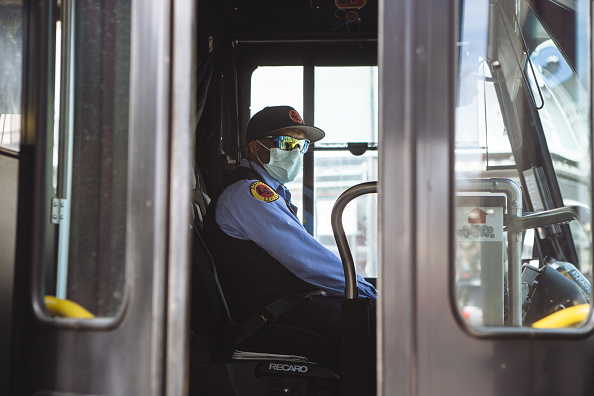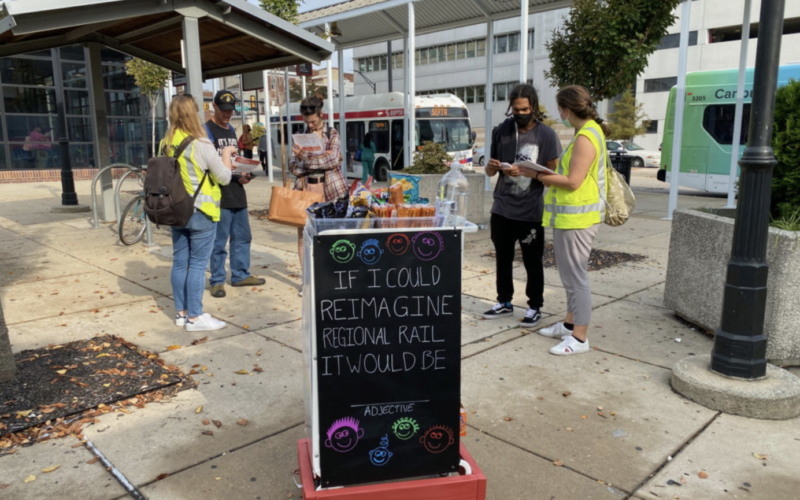
A bus driver in New Rochelle, NY. Photo: Angus Mordant/Bloomberg via Getty Images
Last week, Politico’s Michael Grunwald argued that the priority for any stimulus package should be to contain the coronavirus itself: “The first rule for getting out of a hole is to stop digging, and that means throwing money at any business that can make more tests, masks or ventilators, provide more hospital beds or medical supplies, or otherwise help get the pandemic under control.” The work that transit agencies do — getting health care professionals and other essential workers where they need to go — is undoubtedly an essential service that helps contain the virus.
Even though transit workers are at heightened risk as they transport nurses, doctors, and other essential workers, they themselves have not been accorded recognition as emergency responders. This has led the transit workforce to be considered less of a priority when scarce personal protective equipment (PPE) is distributed. In New York, following federal guidance that is now disputed, the MTA prohibited employees from wearing face masks in a March 6 memorandum that implied masks were the preserve of medical professionals. The agency has since changed course and distributed surgical masks, but nine MTA workers have died from coronavirus complications, and at least 582 employees have tested positive.
Meanwhile, transit agency budgets are buckling under the strain of operating service as fare and tax revenues collapse. Additional expenses related to providing protective equipment and safer work environments further stress agencies’ financial capacity.
The $25 billion allocated to transit nationwide in the federal CARES Act should buy agencies time to ramp up protections for workers while maintaining service. It is important to view this funding as an essential component of the emergency response to the pandemic. The legislation itself gives agencies tremendous leeway to spend the funds on “the operating expenses… related to the response to a coronavirus public health emergency.” The language implicitly recognizes that, unlike some other industries, public transit must continue operating because the service actively helps to combat the pandemic.
Though the $25 billion provides short-term relief for transit agencies as they provide service during the crisis, the full impact of the pandemic will continue to wreak havoc on agency finances. Larger agencies are already counting down the weeks until more assistance is needed.
Transit workers will be vulnerable unless these anticipated shortfalls are addressed. While grants from the CARES Act are expected to cover the “administrative leave of operations personnel due to reductions in service,” if federal funding proves insufficient to fill the gaps in agency budgets, jobs will be lost.
Agencies must be fully prepared and take all necessary steps to avoid this outcome. They should continue to monitor potential shortfalls resulting from the COVID-19 crisis and make their financial needs publicly known, in preparation for further emergency assistance measures. By strongly advocating for their role in the emergency response, agencies can help ensure that transit workers are shielded from layoffs or furloughs resulting from the crisis to which they have bravely and dutifully responded.
 New TransitCenter Report: To Solve Workforce Challenges Once and For All, Transit Agencies Must Put People First
New TransitCenter Report: To Solve Workforce Challenges Once and For All, Transit Agencies Must Put People First
TransitCenter’s new report, “People First” examines the current challenges facing public sector human resources that limit hiring and retention, and outlines potential solutions to rethink this critical agency function.
Read More A Transit Revolution in Philadelphia?
A Transit Revolution in Philadelphia?
The Southeastern Pennsylvania Transportation Authority (SEPTA) has been working throughout the pandemic on several system-wide planning initiatives that have the potential to transform transit service in and around the city of Philadelphia.
Read More